150th Birth Anniversary of Mahatma Gandhi
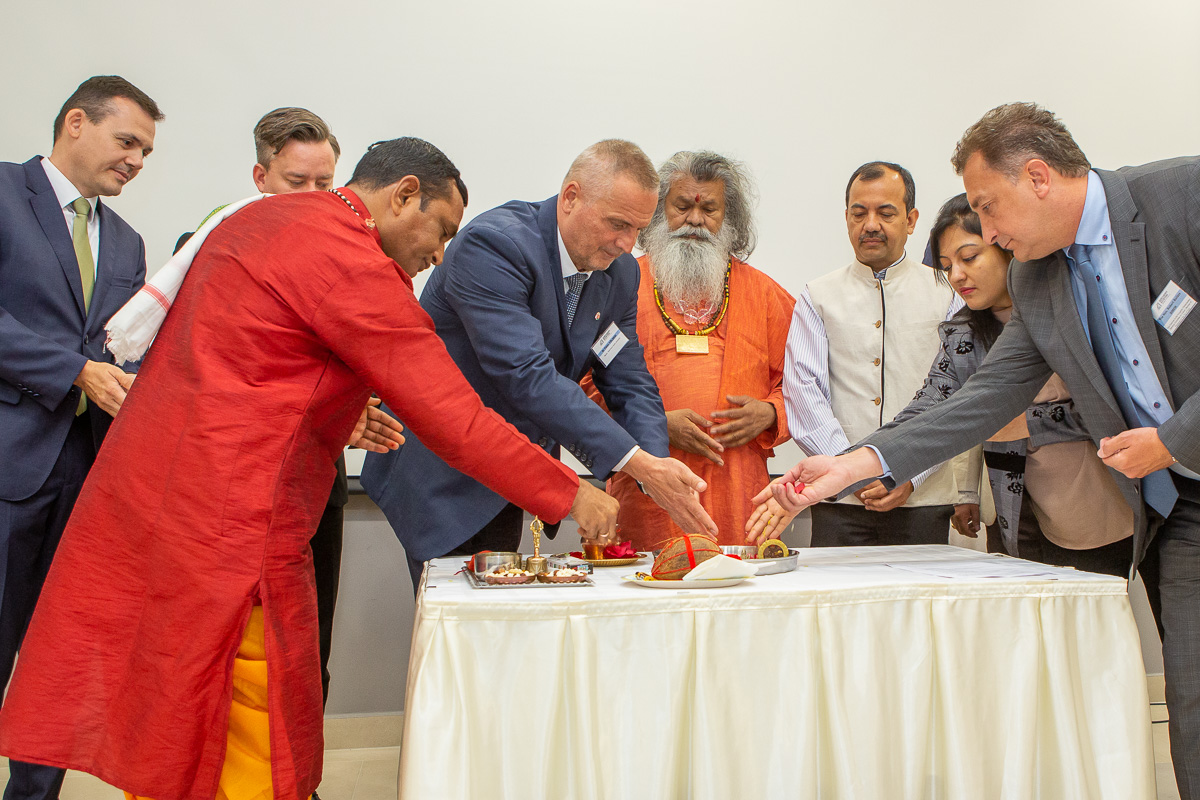 4 July Conference celebrating:
4 July Conference celebrating:
150th Birth Anniversary of Mahatma Gandhi
70th Anniversary of Indian-Hungarian Diplomatic Relations
40th Anniversary of Initiation of Yoga in Daily Life – The System, Hungary
On Thursday 4th July, Széchenyi István University hosted an exclusive conference to celebrate three anniversaries, marking the dual celebration of the 150th Birth Anniversary of Mahatma Gandhi, the 70th Anniversary of the establishment of Hungarian-Indian Diplomatic Relations and the 40th Anniversary of the Initiation of Yoga in Daily Life in Hungary. Thus, the themes of Gandhi Ji’s legacy, the ever-burgeoning relations between the two nations of Hungary and India and the Indian Government’s emphasis on the importance of daily yoga practice formed the central themes of this prestigious event.
Guests speakers for the first session of the Conference on the Indian side were Vishwaguru Sri Mahamandaleshwar Paramhans Swami Maheshwarananda, founder and president of the international NGOs Yoga in Daily Life and the Sri Swami Madhavananda World Peace Council; His Excellency Mr Kumar Tuhin, Ambassador of India to Hungary; Mr Swapnil Kothari, Chancellor of Renaissance University, Founding Chairman & Managing Director, Renaissance-Indira Group of Institutions, Indore, Madhya Pradesh State.
On the Hungarian side were Dr Ferenc Dancs, Deputy State Secretary, Hungarian Ministry of Foreign Affairs and Trade; Mr Róbert Balázs Simon, Member of Parliament for Győr and Vice-Chairman of the Parliamentary Standing Committee on Culture; Mr Zoltán Németh, President of the General Assembly, Győr-Moson-Sopron County Council; Dr Dávid Fekete, Deputy Mayor of Győr Municipality and Mr Károly Kovács, President, Special Advisor, Yoga in Daily Life - The System, Hungarian National Centre.
 Following a traditional Hindu liturgical ceremony celebrated by Vishwaguru Sri Mahamandaleshwar Paramhans Swami Maheshwarananda, Dr Péter Földesi, Rector of Széchenyi István University, delivered a speech welcoming the guests of honour and the more than 200 conference delegates from 18 countries on behalf of the University.
Following a traditional Hindu liturgical ceremony celebrated by Vishwaguru Sri Mahamandaleshwar Paramhans Swami Maheshwarananda, Dr Péter Földesi, Rector of Széchenyi István University, delivered a speech welcoming the guests of honour and the more than 200 conference delegates from 18 countries on behalf of the University.
He first expressed his most profound gratitude to Vishwaguruji for gracing the conference with his presence and offering his congratulations on the 40th Anniversary of the initiation of the system Yoga in Daily Life, of which Swamii-ji is the founder. Furthermore, Dr Földesi revealed that during Swami-ji’s recent visit to the UK Houses of Parliament on the occasion of the International Day of Yoga, in recognition of his services to yoga and Indian traditional sciences, he was presented with a Yoga Ratna (Jewel of Yoga) award by an all party parliamentary group.
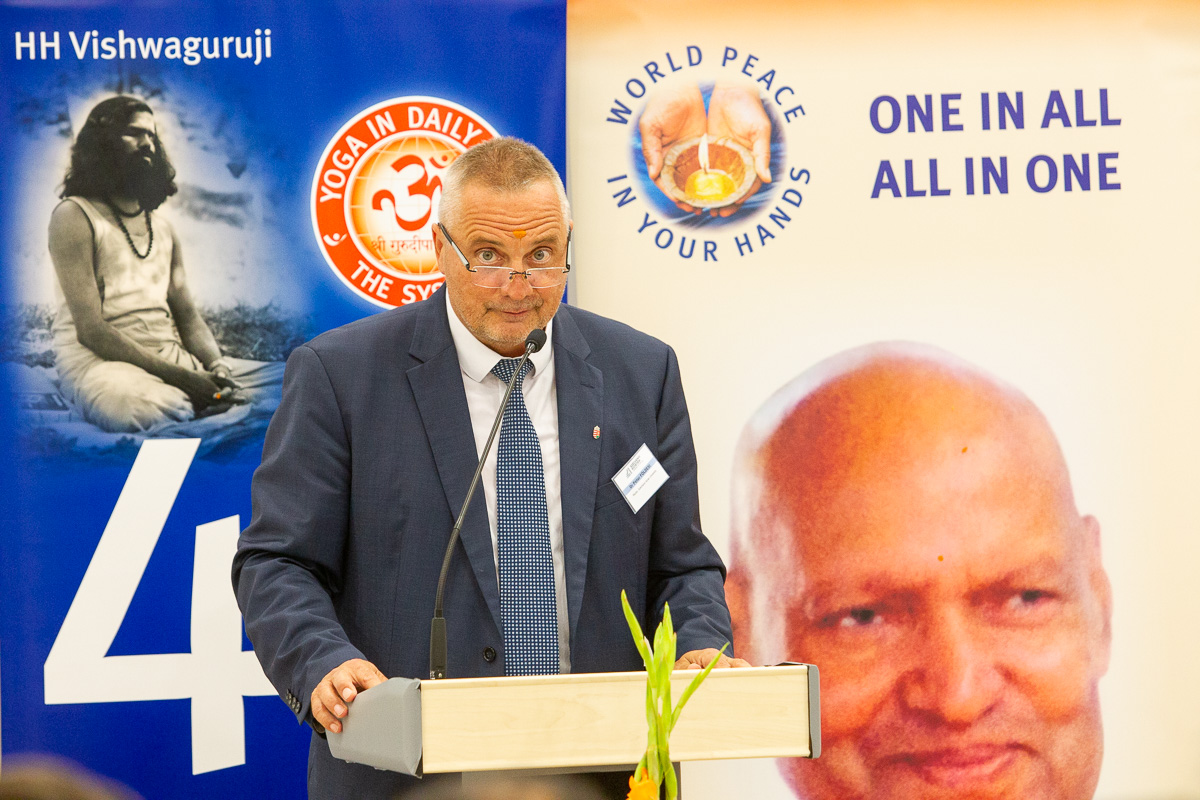 In his welcome speech, the Rector mentioned how Ambassador Tuhin had already kindly paid the University a visit during which he met a group of Indian students. He further expressed the hope that India will provide a continuing and expanding source for the recruitment of applicants. Dr Földesi also extended his gratitude to Vishwaguruji for his generous contributions to the building up of the Indian community at Széchenyi István University.
In his welcome speech, the Rector mentioned how Ambassador Tuhin had already kindly paid the University a visit during which he met a group of Indian students. He further expressed the hope that India will provide a continuing and expanding source for the recruitment of applicants. Dr Földesi also extended his gratitude to Vishwaguruji for his generous contributions to the building up of the Indian community at Széchenyi István University.
The Rector emphasized how the burgeoning relations between India and Hungary created over the decades are today indeed a true cause for celebration and how, ever since the beginning of the process of internationalization, Széchenyi István University has constantly strived to establish ever closer cooperation with the Indian Embassy to Hungary. He recalled last year’s Indian Cultural Festival held at the University and the fact that also this year the University marked the celebration of the International Day of Yoga with a well attended public yoga session. Dr Földesi continued his speech on the theme of the relevance of Gandhi–Ji’s legacy in modern times. In his exposure of Mahatma Gandhi’s views on education, he highlighted the fact that, according to Gandhi, education is the realization of the best in man - body, soul and spirit.
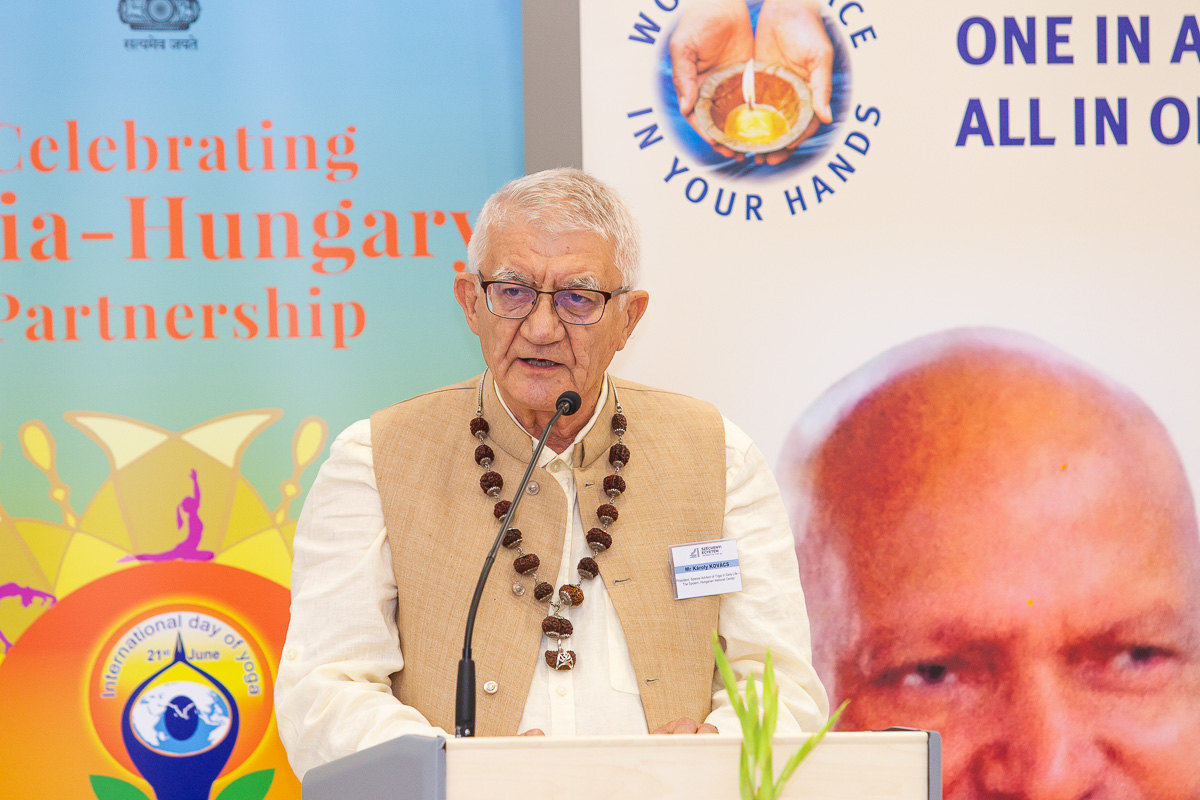 Following the Rector’s speech was a presentation from Mr Károly Kovács, President, Yoga in Daily Life Hungary. Having extended a special welcome to the guests of honour, Mr Kovács went on to relate how Vishwaguruji had made the acquaintance of two presidents of Hungary, granting an audience on two occasions to President Árpád Göncz and meeting President János Áder in 2012 at the UN Rio+20 Conference, on which occasion the President invited Vishwaguruji to the Tajik-Hungarian Water Initiative Conference. He reminded conference delegates that one of Vishwaguruji’s greatest humanitarian aid programmes is the Desert Rainwater Harvesting Initiative with which he represented the Yoga in Daily Life System at the Rio+20 Conference. Furthermore, he revealed that altogether 540,000 copies of Vishwaguruji’s book in Hungarian translation have been sold in Hungary, from which, in the last four decades, millions of people have practised yoga.
Following the Rector’s speech was a presentation from Mr Károly Kovács, President, Yoga in Daily Life Hungary. Having extended a special welcome to the guests of honour, Mr Kovács went on to relate how Vishwaguruji had made the acquaintance of two presidents of Hungary, granting an audience on two occasions to President Árpád Göncz and meeting President János Áder in 2012 at the UN Rio+20 Conference, on which occasion the President invited Vishwaguruji to the Tajik-Hungarian Water Initiative Conference. He reminded conference delegates that one of Vishwaguruji’s greatest humanitarian aid programmes is the Desert Rainwater Harvesting Initiative with which he represented the Yoga in Daily Life System at the Rio+20 Conference. Furthermore, he revealed that altogether 540,000 copies of Vishwaguruji’s book in Hungarian translation have been sold in Hungary, from which, in the last four decades, millions of people have practised yoga.
The subsequent speaker was Dr Ferenc Dancs, Deputy State Secretary at the Hungarian Ministry of Foreign Affairs and Trade. Offering some words in remembrance of the 70th anniversary of the establishment of diplomatic relations between India and Hungary, Dr Dancs commented how Hungary is particularly proud of being among the first countries who established diplomatic relations with the independent India 70 years ago.
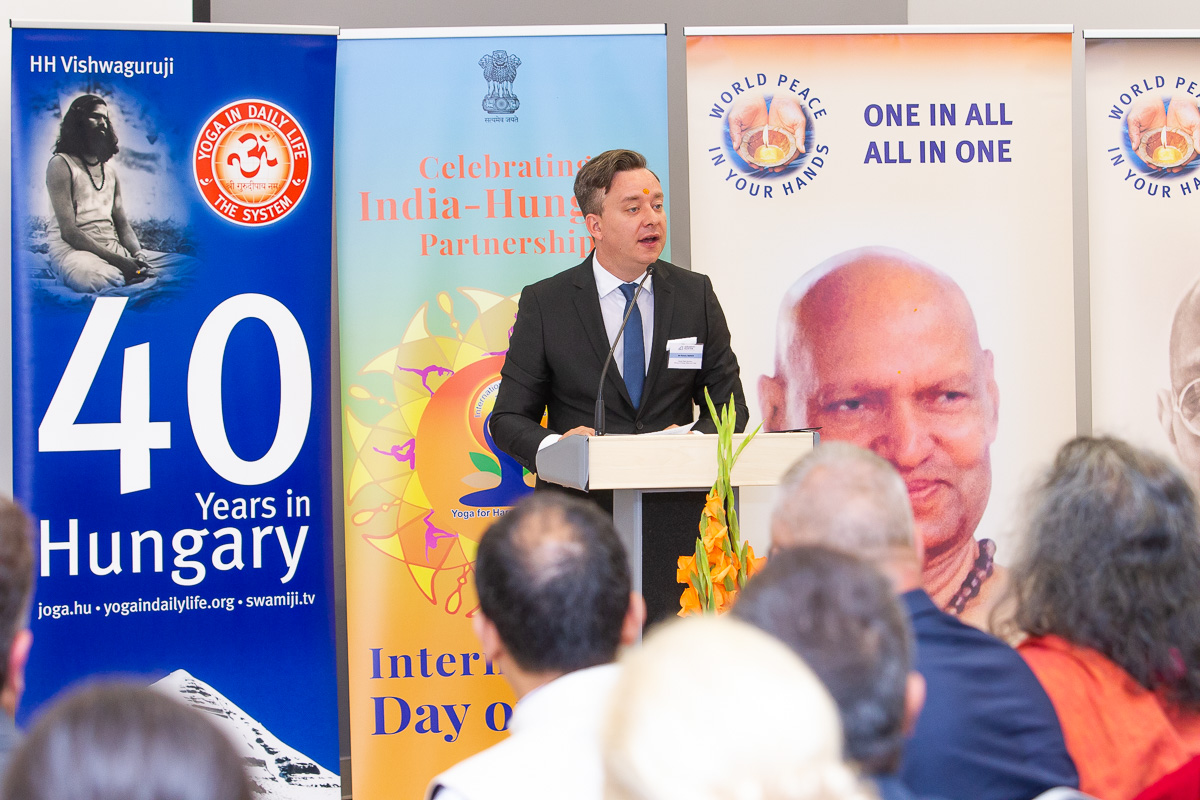 Shared fundamental principles of democracy and the rule of law combined with the long and rich history of cultural and economic ties provided us with an exceptionally solid basis to build excellent bilateral ties. He highlighted the fact that Hungary and India have a long history of co-operation dating back to the late 19th and early 20th century and outlined that bilateral agreements in various fields have been signed to strengthen cooperation in the field of trade, culture, education and investment. He went on to comment that the culture and rich spirituality of India was always and still is an important source of inspiration.
Shared fundamental principles of democracy and the rule of law combined with the long and rich history of cultural and economic ties provided us with an exceptionally solid basis to build excellent bilateral ties. He highlighted the fact that Hungary and India have a long history of co-operation dating back to the late 19th and early 20th century and outlined that bilateral agreements in various fields have been signed to strengthen cooperation in the field of trade, culture, education and investment. He went on to comment that the culture and rich spirituality of India was always and still is an important source of inspiration.
In the section of his speech devoted to Mahatma Gandhi, Dr Dancs reminded the audience that Mahatma Gandhi's memory and teachings are highly appreciated in Hungary, his dignified humility and modesty setting an example for today's politicians as well as for the future generations. He made the point that non-violence, as a main premise and method has become the principle idea and basis of UN decisions as well. Moving on to contemporary Indian-Hungarian relations, he mentioned that the visit of Prime Minister Viktor Orbán to India was a milestone in the history of bilateral relations. The visit to Hungary of H.E. Mr. Mohammad Hamid Ansari, Vice President of India, in 2016 provided an excellent opportunity to review our relations and exchange views on international developments.
Having briefly outlined the rapid upswing of the two nations’ economic cooperation, with bilateral trade reaching 736 M USD in 2018, Dr Dancs emphasized his encouragement of further investments of Indian companies in Hungary, particularly in the IT sectors, pharmaceuticals, biotechnology, regional service, R&D and tourism. In conclusion, he mentioned the increasing significance of India’s international position and prestige. Finally, The Deputy State Secretary highlighted the fact that the Foreign Affairs Council had adopted the new EU strategy for India in December 2018, giving potential new impetus to EU-India relations.
The subsequent speaker, Mr Swapnil Kothari, Chancellor of Renaissance University, had as the main theme of his presentation the 'Seven Social Sins' as denounced by Mahatma Gandhi: Wealth without work, Commerce without morality, Education without character, Pleasure without conscience, Science without humanity, Worship without sacrifice. The Chancellor presented the delegates with contemporary examples of these social sins. Dr Kothari also thanked Vishwaguruji for his guidance and fruitful cooperation.
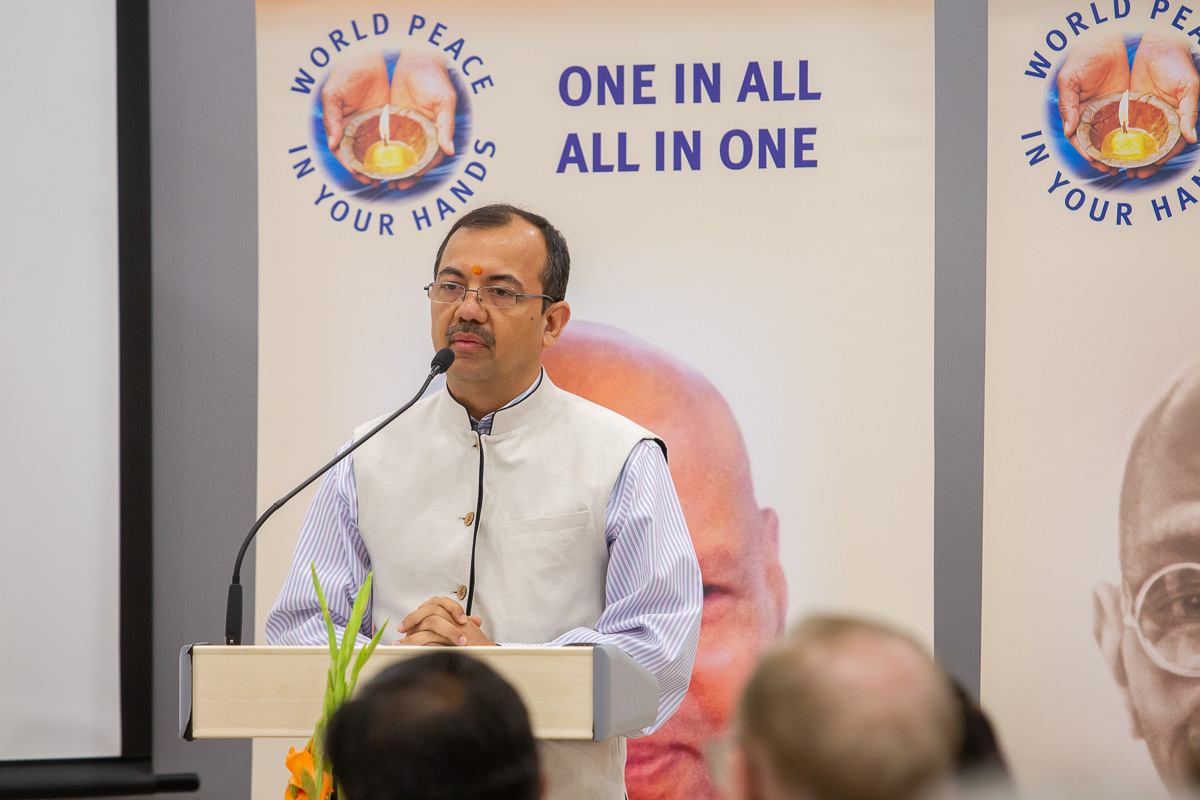 Next to speak was the Ambassador of India to Hungary, His Excellency Mr Kumar Tuhin, who commenced his speech with a reminder that the teachings and thoughts of Mahatma Gandhi are as relevant today as they were during his lifetime. Consequently he brought the delegates’ attention to the many activities being organized by Indian embassies all over the world and by various organizations and institutions within India to remember and keep aloft Gandhi’s ideals, principles and teachings.
Next to speak was the Ambassador of India to Hungary, His Excellency Mr Kumar Tuhin, who commenced his speech with a reminder that the teachings and thoughts of Mahatma Gandhi are as relevant today as they were during his lifetime. Consequently he brought the delegates’ attention to the many activities being organized by Indian embassies all over the world and by various organizations and institutions within India to remember and keep aloft Gandhi’s ideals, principles and teachings.
The Ambassador went on to give details of the programmes being organized by the Indian embassy in Hungary.
Regarding the 70th anniversary of the establishment of diplomatic relations between India and Hungary, Mr Tuhin noted how relations between the two nations are deeply rooted and have withstood the test of time despite changes in the geopolitical situation. The Ambassador emphasized how Hungary and India enjoyed excellent friendly relations based on mutual respect, shared values and interests. He highlighted the fact that bilateral trade is steadily increasing with a growth rate close to 18% and also revealed that Indian investment in Hungary is close to US$2 billion, with Indian companies providing employment to close to 10,000 people in Hungary. Furthermore, the Ambassador expressed his pleasure that the number of Indian students in Hungary is growing and that the number of students coming to Széchenyi István University is also due to increase in the new academic year.
Mr Tuhin concluded his speech with a tribute to the third commemorative event of the conference - the 40th anniversary of Yoga in Daily Life (YIDL) in Hungary, commenting that the value of Yoga has now been recognized all over the world. He emphasized how The Embassy of India was happy to partner with Yoga in Daily Life in organising the International Day of Yoga event on 22nd June 2019 at Széchenyi István University.
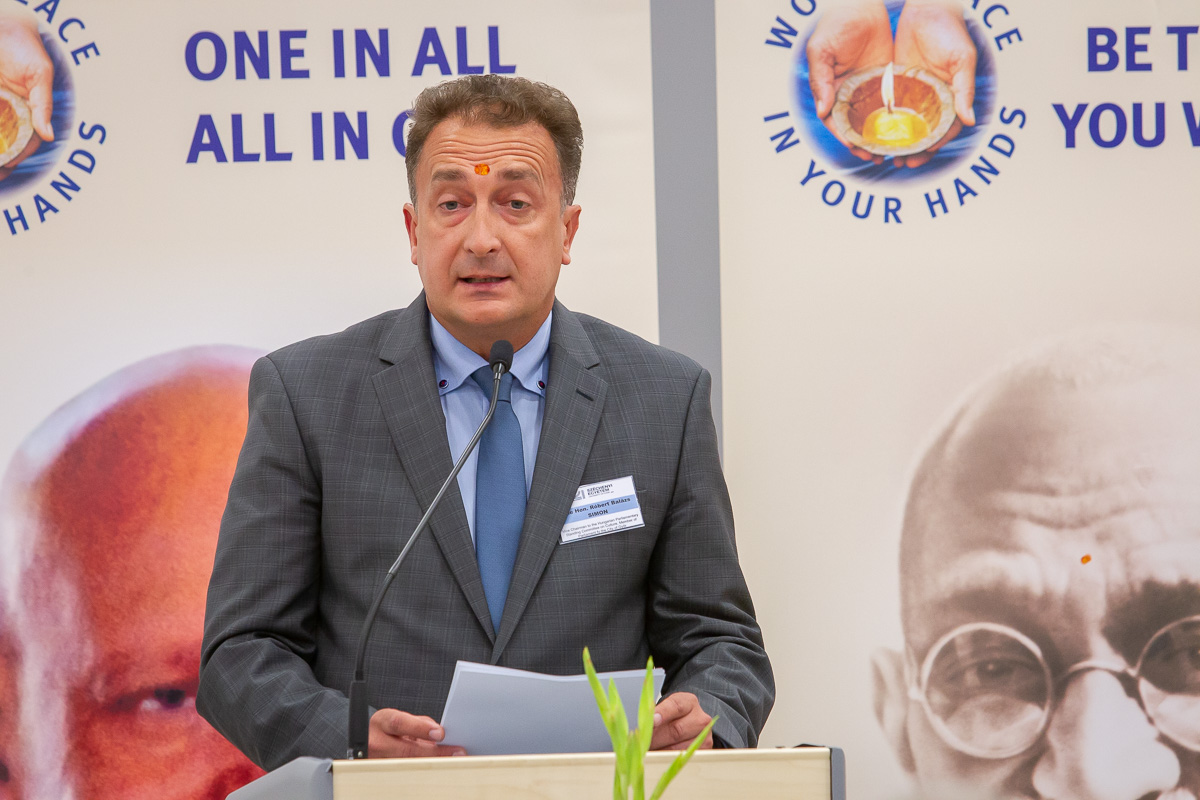 Mr Róbert Balázs Simon, Member of Parliament for Győr and Vice-Chairman of the Parliamentary Standing Committee on Culture, was the next speaker. Having expressed his welcome and thanks to the guest speakers, he continued with a brief tribute to each of the three commemorative events being marked by the Conference, noting that 2nd October, the date of the 150th anniversary of the birth of Mahatma Gandhi, has been declared by the UN General Assembly a World Day of Non-violence in Gandhi’s honour. Having talked about the mutual respect and co-operation between Hungary and India, which has intensified in recent years in both the political sphere and in the field of economic investment, the Honourable Member of Parliament moved to the topic of cultural relations which he described as “outstanding”. The final theme of Mr Simon’s speech was Széchenyi István University. He characterized it as a decisive and successful institution within Hungarian higher education and the key to the development of Győr and the region. Referring to the very recent opening of the Management Campus, the venue of the conference, he emphasized the extent to which the University’s infrastructure is continuously expanding.
Mr Róbert Balázs Simon, Member of Parliament for Győr and Vice-Chairman of the Parliamentary Standing Committee on Culture, was the next speaker. Having expressed his welcome and thanks to the guest speakers, he continued with a brief tribute to each of the three commemorative events being marked by the Conference, noting that 2nd October, the date of the 150th anniversary of the birth of Mahatma Gandhi, has been declared by the UN General Assembly a World Day of Non-violence in Gandhi’s honour. Having talked about the mutual respect and co-operation between Hungary and India, which has intensified in recent years in both the political sphere and in the field of economic investment, the Honourable Member of Parliament moved to the topic of cultural relations which he described as “outstanding”. The final theme of Mr Simon’s speech was Széchenyi István University. He characterized it as a decisive and successful institution within Hungarian higher education and the key to the development of Győr and the region. Referring to the very recent opening of the Management Campus, the venue of the conference, he emphasized the extent to which the University’s infrastructure is continuously expanding.
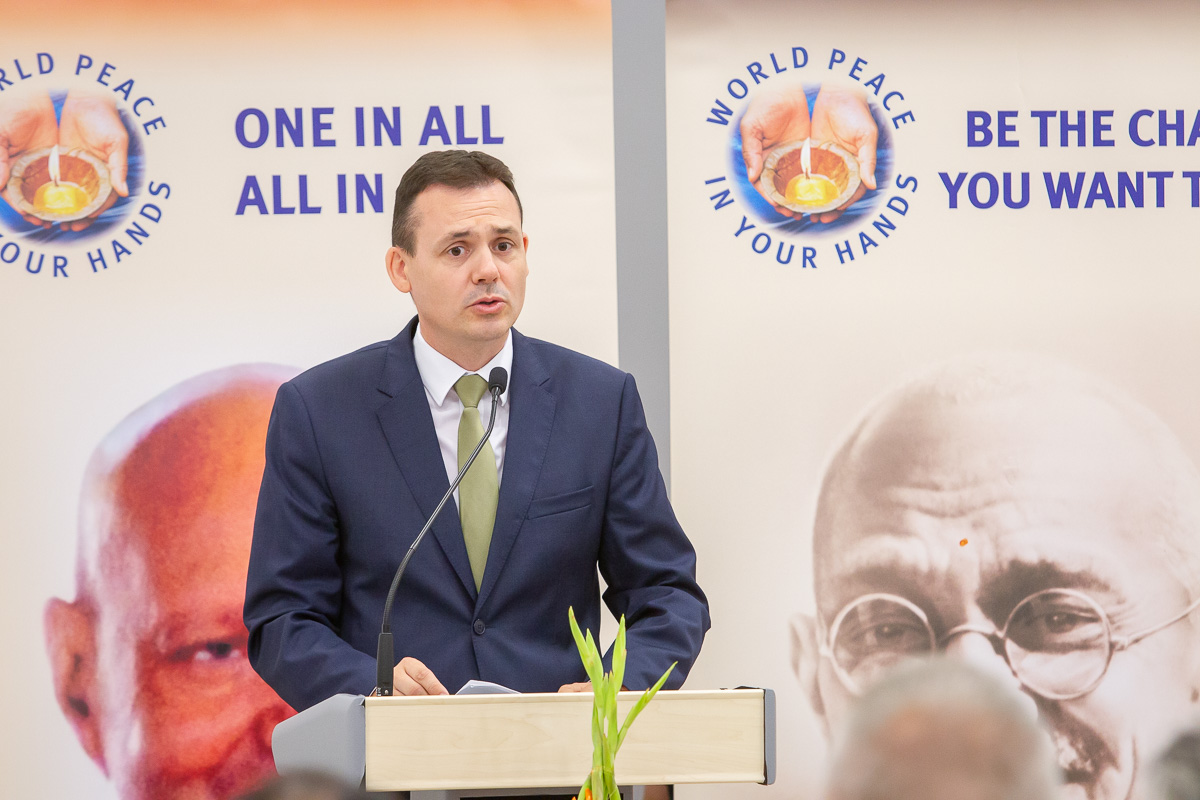 Following the Honourable Member of Parliament for Győr was Mr Zoltán Németh, President, General Assembly, Győr-Moson-Sopron County Council. The beginning of his presentation was concerned with an exposition of the development of historical relations between India and Hungary to the present day and followed by a discussion of the two nations’ talents, cultures and values. He continued with a discussion of the thinking in the two nations today and the strong focus on the transformation of the countries for the well-being of the population, going further to make a comparison of their socio-economic development.
Following the Honourable Member of Parliament for Győr was Mr Zoltán Németh, President, General Assembly, Győr-Moson-Sopron County Council. The beginning of his presentation was concerned with an exposition of the development of historical relations between India and Hungary to the present day and followed by a discussion of the two nations’ talents, cultures and values. He continued with a discussion of the thinking in the two nations today and the strong focus on the transformation of the countries for the well-being of the population, going further to make a comparison of their socio-economic development.
Mr Németh subsequently went into some detail on the history of Hungarian-Indian cultural relations. He finished his speech by mentioning the importance of education and the numbers of Indian students enquiring about study opportunities in Hungary, also describing the high level of educational, cultural and sporting possibilities on offer in this region. He completed his speech with a reference to the local economy, especially in the vehicle industry, and a specific point of connection with India - SMR (Samvardhana Motherson Reflectec) - a major employer in the county.
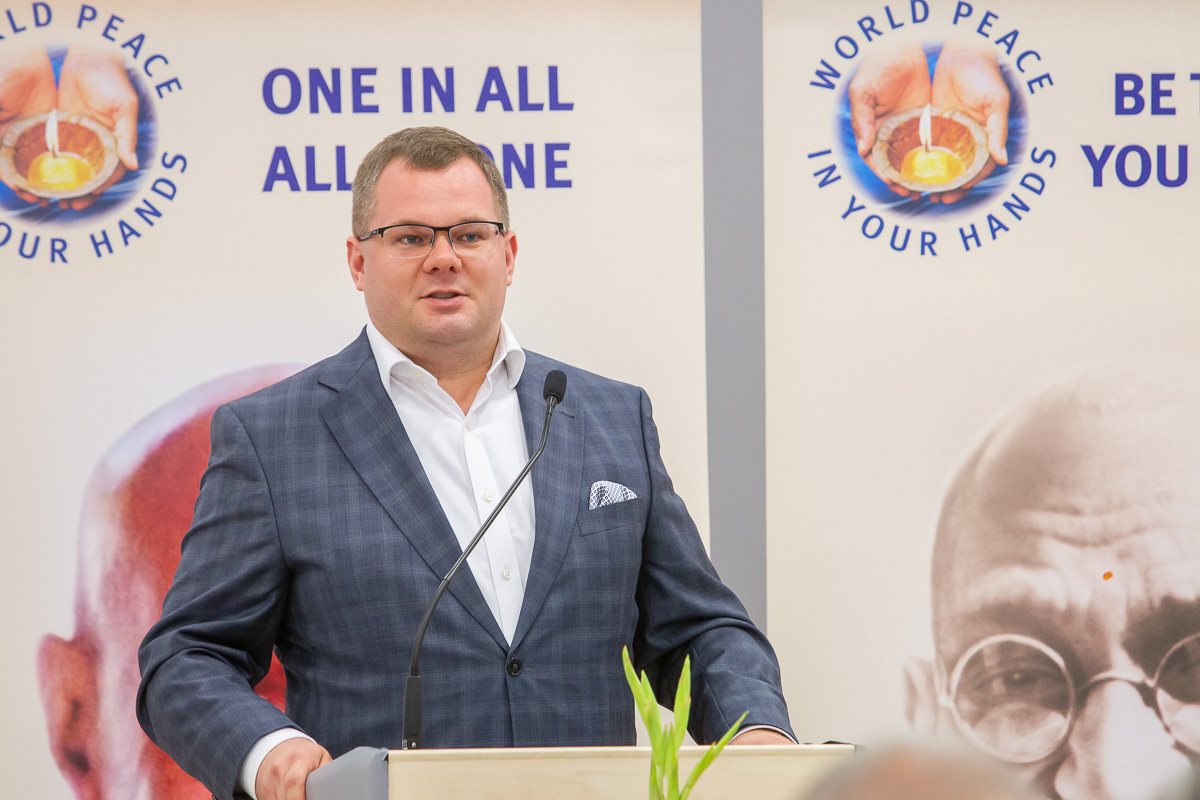 Dr Dávid Fekete, Deputy Mayor, Municipality of Győr, followed with his speech to the Conference. He began his presentation with a direct quotation of Gandhi’s words. "Be the change you want to see in the world!" and went on to describe how, by his actions, Gandhi proved how true his words were and showed that the world can be changed without resorting to violence. He followed this by outlining the reasons for celebrating the 70th anniversary of Hungarian-Indian diplomatic relations, citing a series of economic, cultural, and scientific relationships which show our mutual respect and recognition. Dr Fekete highlighted the good relationship existing between the Embassy and the city of Győr, and the diverse programmes raising awareness of Indian culture among the residents of Győr.
Dr Dávid Fekete, Deputy Mayor, Municipality of Győr, followed with his speech to the Conference. He began his presentation with a direct quotation of Gandhi’s words. "Be the change you want to see in the world!" and went on to describe how, by his actions, Gandhi proved how true his words were and showed that the world can be changed without resorting to violence. He followed this by outlining the reasons for celebrating the 70th anniversary of Hungarian-Indian diplomatic relations, citing a series of economic, cultural, and scientific relationships which show our mutual respect and recognition. Dr Fekete highlighted the good relationship existing between the Embassy and the city of Győr, and the diverse programmes raising awareness of Indian culture among the residents of Győr.
Before the speech of the guest of honour His Holiness Vishwaguru Sri Mahamandaleshwar Paramhans Swami Maheshwarananda, conference participants were shown a video introducing OM Ashram - Home of Yoga and Spirituality – an initiative of Vishwaguruji.
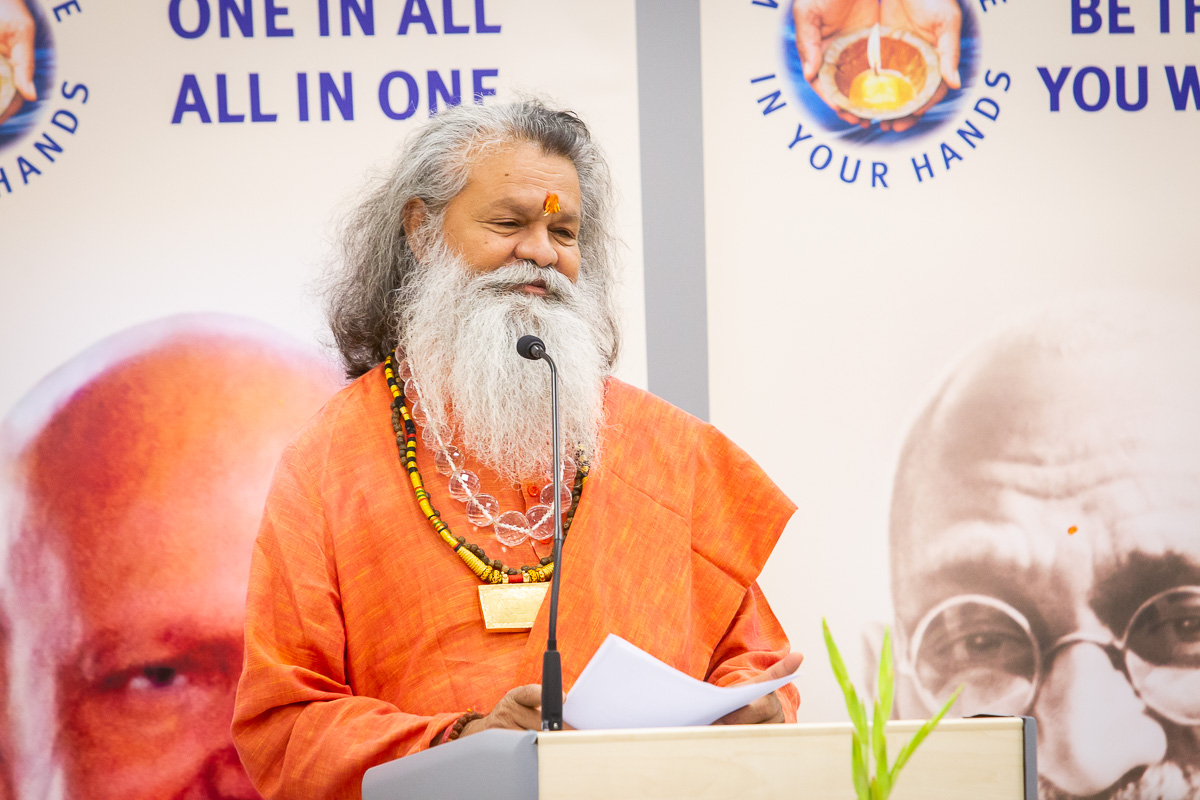
In his speech, the creator of Yoga in Daily Life recalled the times when he first visited Hungary in the 1970s, during the period of socialism. He revealed that he had been surprised to find that his book had been published in large numbers and was so popular, but was very pleased, as it laid the foundations for future successes, with the opening of a network of yoga centres operating throughout the Carpathian Basin. His Holiness addressed the international audience with congratulations and with words of gratitude especially to Hungarian citizens for showing such dedication in spreading and regularly practicing Yoga in Daily Life for the past 40 years.
Vishwaguruji then continued with an exploration into the depths of his philosophy, gently suggesting to further “practice with discipline simple Yoga exercises, pranayamas, a little concentration and to consume only sattvic (pure, healthy) food”. He outlined how millions around the world have become vegetarians and nowadays also vegans, due to the continuous endeavours of Yoga in Daily Life on a global scale. Vishwaguruji praised the actions of Indian Prime Minister Modi in spreading the knowledge and wisdom of genuine Yoga both in India and around the world by his initiation of the proclamation of 21st June as an annual International Day of Yoga by the UN in 2014.
Vishwaguruji expressed his gratitude to the Rector for hosting the international WPC Conference and dedicated “prayers for blessings for University students to spread the light around the world”. Subsequent to Vishwaguruji’s speech, conference delegates visited the Peace Tree planted in 2014 with Dr. Péter Földesi, Rector.











